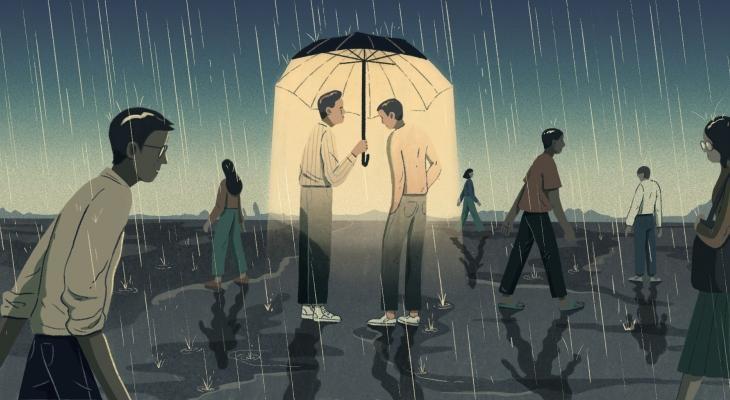A Refugee Struggles with Mental Illness in Indonesia
Fate wants me to be a witness to the COVID-19 era. Fate also has me as a refugee. The impact of COVID-19 on the refugee community is heavy because it is us and the walls of our home only. Negative thoughts come to you. Schools and everything closed and the fear of disease have psychological effects on us all. With the closing of all shops and homes, the economic situation is difficult.
Suicide and suicidal thoughts among refugees increased alarmingly during this pandemic. There is a state of growing despair. We don't know when the pandemic will end and how we can protect ourselves. We see a lack of solutions and a lack of hope for the future.
Lonely in this world, there is no one to help me or share my worries. I do not talk much. Silence is my life, there is no one to turn to with my grief. I feel excluded and disinterested. Sadness deepened in me, I cannot sleep. I am depressed and alone. I feel pain and pressure.
A social worker advised me to visit a psychologist, I thought about it and agreed to see a psychologist. With this doctor, my life changed. At first, I felt that I did not have anything to say. I did not know where to start. I asked myself if I really had a problem and why was I here? I said to myself that I would not talk about some problems because I was concerned about being judged or maybe I’ll underestimate my feelings, but all of these did not happen. The doctor was a good person. I spoke to him. I felt better. I have known the doctor since that meeting in 2018.
He is more than a doctor. He is a friend. And his name is Kevin.
Kevin is my moral support and an important influence in changing my life. He taught me how to form relationships with new friends, gave me self-confidence, taught me good behaviour, and the resilience to live despite my trauma. He encouraged me. He helped me change my unhealthy habits, and control my emotions with mindfulness. He stays in touch with me via email or WhatsApp.
A friend who is positive helps his friends to hold on to life.Your friend feels enough pressure and frustration. Be a strong pillar, find some way to provide support, extend a helping hand, psychological and financial. Most importantly, listen to them and advise them.
I felt better after four months. I was fortunate to have this doctor. The relationship between us was built quietly and calmly, although I have a long way to go.
However, there are thousands of refugees who do not have such a chance; instead they receive advice that cause their mental health condition to deteriorate in a way that may lead them to suicide. I have friends who suffer from psychological problems.
The Sudanese refugee communities have faced bullying, and are now experiencing serious psychological conditions. If we want to change their lives to better cope with their current reality, psychological assistance would be useful to create some stability for them.
Even before the pandemic, most refugees were facing difficulties in obtaining psychological care. Refugees have to wait a long time to see a psychologist. With COVID-19, it has become more difficult. Friendships for a refugee are important for mental health, as true friendships lead to the growth of trust, affection, loyalty and sympathy for a person.
A refugee needs a sense of belonging and appreciation, and friendship provides that. Friends contribute to psychological support and help us overcome fears, especially when a person is considering suicide. It may prevent a person from seeking to end his life. We all need friends to relieve us of the problems we are facing because we simply need someone to talk to about what happens to us, no matter how difficult. Sharing what we are going through makes us feel the best. Long-term loneliness is frustrating and exposes a person to depression. A friend is the best cure for this loneliness, as it contributes to raising our spirits and weathering the tough times together.
(Illustration: Ng Yin Shian)
Abu Maha is a member of the archipelago, a writers collective that builds community and mentorship with refugee and migrant background writers. The collective was founded to train new writers who are refugees in Indonesia towards professional publication and forge relationships between writers across islands. This piece was written as part of the partnership between Our Better World and the archipelago.






